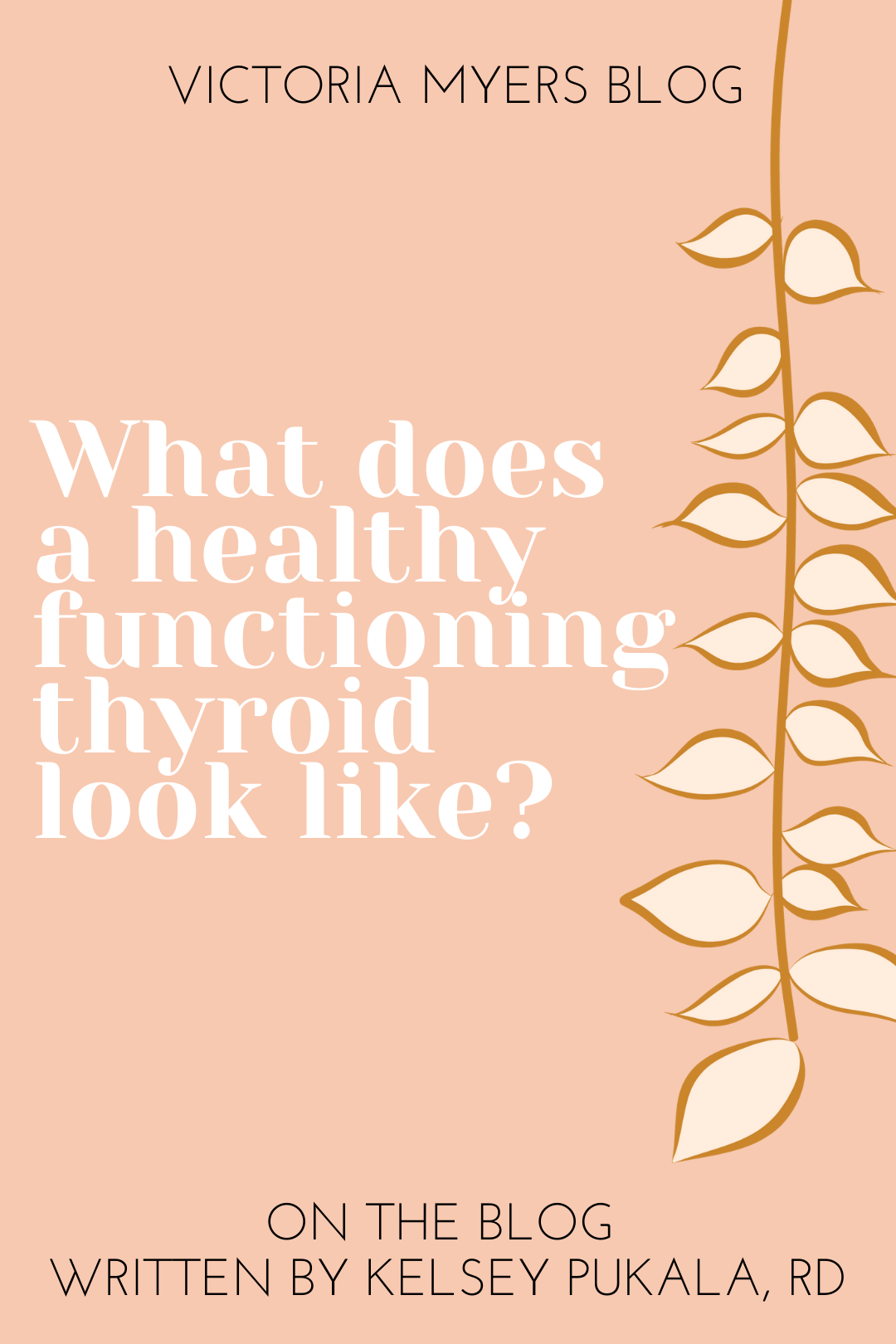How the Thyroid is Disrupted by Disordered Eating
By: Kelsey Pukala, registered dietitian/nutritionist at Nourishing Minds Nutrition
What is the Thyroid?
The thyroid gland is a vital hormone gland that plays an important role in metabolism. It also is essential for human growth and development. The thyroid regulates several different functions by releasing steady amounts of thyroid hormone into the blood. It works like a feedback loop, which basically means if the body needs more energy (i.e. if you’re feeling cold or growing or pregnant), the thyroid gland will respond by producing more hormone.
It’s located at the front of the neck and is shaped like a butterfly with each “wing” almost wrapping around the windpipe. If you’ve ever experienced issues with your thyroid, sometimes it can grow and protrude slightly which can be a sign that hormone production is disrupted.
The thyroid gland produces three hormones: T3, T4 and calcitonin. And, interestingly enough, iodine is a very important building block for T3 and T4, which is why we need to get enough in our diet. This shouldn’t be a problem in the US because most of our salt has iodine in it. However, in some developing countries without sufficient sources of iodine, the thyroid can actually enlarge due to insufficient production of hormones.
The pituitary gland helps out the thyroid quite a bit. It “tells” the thyroid whether to release more or less hormone into the blood. So, it functions like the “red light green light” system for the thyroid to release hormones.
What does a healthy functioning thyroid look like?
The most basic answer to this is when all three hormones (T3, T4 and calcitonin) are functioning correctly. We won’t talk much about calcitonin, but just know that’s it’s involved in calcium and bone metabolism.
I want to talk more about T3 and T4 as they do a TON! These hormones increase basal metabolic rate, which makes all the cells in your body work harder, requiring more energy. That means these hormones can:
-Raise body temperature
-Lead to a faster pulse and stronger heartbeat
-Food is used up more quickly because energy that is stored in the liver is then broken down
-The brain matures, and growth is promoted in children
-The nervous system is activated which leads to improved concentration
Something else to note about the pituitary gland is that it makes TSH (thyroid stimulating hormone) and this tells your thyroid to make T4. T4 is an inactive thyroid hormone and must be converted to the active version of T3 to actually be used. T4 can also be converted to reverse T3, which is inactive and blocks the effects of T3. Understanding this is important because this is how disordered eating will disrupt the thyroid functioning process.
When all of these hormones harmonize together to create an optimal system, that’s when the thyroid is functioning correctly.
How does disordered eating disrupt the thyroid gland?
Anytime we diet, detox, restrict food groups, etc. all of these things wreak havoc on your thyroid. Research actually shows that just 3 weeks of calorie restriction can actually cause a reduction in T4 conversion to T3 (that active form of T3 that we need to do all of those awesome things I described above!). When the body experiences significant disruption in energy intake, the thyroid will adapt and adjust the metabolism to help the body maintain homeostasis. This may seem like a good thing… and in some ways, it is because our bodies were created to fight to keep us alive. In extreme situations, we as humans need to be able to adapt in order to survive and continue to function.
Unfortunately, this forces the body to acclimate to the new restrictive eating patterns and over time, this stresses out the thyroid. This can be due to lack of sufficient nutrients to convert T4 to T3 (the body literally doesn’t have the energy to make this conversion) and it can also be due to elevated cortisol. Cortisol is our stress hormone that can be elevated due to things like lack of sleep, under-eating, exercise and stress.
Signs and symptoms that something could be wrong with the thyroid
If thyroid hormone is low, things in the body will slow. Which makes sense, right? If there isn’t enough hormone, the body will be forced to acclimate. Fatigue is very common and a classic symptom of hypothyroidism (slowing of the thyroid), but some other symptoms include: constipation, poor digestion, depression and feeling cold. Hair loss can also occur. Just think about the entire body slowing down.
Sometimes doctors will want to medicate if lab values are “off.” That can totally be okay and we completely support medication when necessary. However, when the thyroid hormone production is slowed due to disordered eating and/or stress, it can be reversed with lifestyle factors. The body is very resilient! This is just something to consider if you’ve been diagnosed with hypothyroid. Occasionally, a medication would only mask an underlying problem of under-eating.
Important lab tests to run:
Usually, doctors will run something called a CBC (complete blood count) if you request labs. This will only look at your TSH levels which is that hormone produced by the pituitary gland. However, TSH can be normal while T3 and T4 are not normal. I always recommend a FULL thyroid panel of TSH, T3 and T4 for clients because you can then see if anything is really going on.
Technically, optimal ranges for TSH can range from 1 to 4. A woman in her fertile years should usually have a TSH between 1 and 2. Sometimes, labs will have different reference ranges depending on how each lab is measured, so it’s best to talk with your healthcare provider if you suspect any of your thyroid labs values are out of range. **Normally the reference range is included on your lab work**
How can you correct a thyroid issue related to disordered eating?
This is definitely something that’s easier said than done! Important things to consider would be nourishing your body adequately with all of the macronutrients (protein, complex carbohydrates and fat), sleeping at least 7-8 hours per night, practicing self-care and stress reducing activities and moving your body in a way that feels healthy for you. Working with a non-diet Dietitian can be immensely helpful during this process of navigating eating enough.
Something important to note is that you can also have something called hyperthyroid (and even autoimmune conditions like Hashimoto’s), which is overproduction of thyroid hormones. This is also problematic and can lead to symptoms like hand tremors, anxiety, unintentional weight loss and rapid heartbeat. Normally, these stem from genetic conditions rather than an eating disorder and should be treated by your healthcare provider, usually with medication.






